Milou Voogd, Yvette Keuzenkamp & Merel Mulder
&width=400&height=400)
“We want to build bridges with the card game. By engaging in conversation with people who have different opinions, we create space for nuance and growth.”
How do you experience diversity and inclusion in your workplace?
Milou, Yvette, and Merel are involved in organizing various activities for medical students. Each year, a number of key focus areas are set. Yvette: “An important recurring focus is student wellbeing. Since the COVID-19 pandemic, this topic has become even more prominent on the agenda. In addition to the importance of student wellbeing, diversity and inclusion are also a key part of this project. It’s about equal opportunities and an inclusive learning environment—separate from wellbeing issues.”
A great example of their efforts in the field of student wellbeing is the card game about inappropriate behavior, Milou explains. “The card game was launched in 2023 by Koen Wijsman, Chris Vellenga, Lisanne Wezenaar, and Nander van Heek. It received a lot of media attention, which resulted in over 4,000 card games being distributed. Requests came from all over the Netherlands, even from outside the medical field. This emphasizes how great the need is and how valuable this initiative is.”
Why are diversity and inclusion important within this project?
Yvette: “Within healthcare, diversity and inclusion are not a luxury—they are a necessity. A survey shows that no less than 20% of medical students have experienced inappropriate behavior during their studies. These situations are rarely reported. Often, they are only discussed with a few friends. A major reason is the significant hierarchy in the medical world and the dependent position in which students find themselves. This makes it difficult to intervene or raise issues.”
“That’s exactly why the card game is so valuable,” Merel adds. “It makes difficult topics, such as inappropriate behavior, approachable. The cards contain real, anonymized situations. They encourage open conversations in a safe setting and help students put words to experiences that often remain unspoken.”
The Leiden Co-Council represents students in vulnerable positions. This game contributes to a safer and more inclusive learning environment, in which forms of (subtle) exclusion or microaggressions are made discussable. Merel: “Take, for example, the card with the question: ‘Where are you really from?’ This seems like a friendly question, but if you hear it dozens of times a day as a student because you do not have white skin, it can be annoying and exhausting. These are exactly the kinds of situations that provide insight into the effect of behavior that is often unintentionally harmful. The card game invites reflection without being didactic. It allows room for different perspectives, including situations in the so-called ‘gray area’—such as placing a hand on someone’s shoulder. These gray areas are particularly interesting because they lead to real conversations.”
Milou: “With the card game, we want to build bridges. By engaging in conversation with people who have different opinions, we create space for nuance and growth. We have already been able to inspire many people. We hope that discussions about diversity, inclusion, and safety in healthcare will only increase because of this.”
What advice do you have for a more inclusive workplace and society?
Milou: “Be open to other perspectives and stay curious about the experiences of others. Have the conversation, even if it feels uncomfortable. You never know exactly what it is like for someone else to experience something—that’s why listening and keeping the conversation going is so important.” “And of course: play the game!” adds Yvette.
Interested in the card game? Email: leidschecoraad@mfls.nl